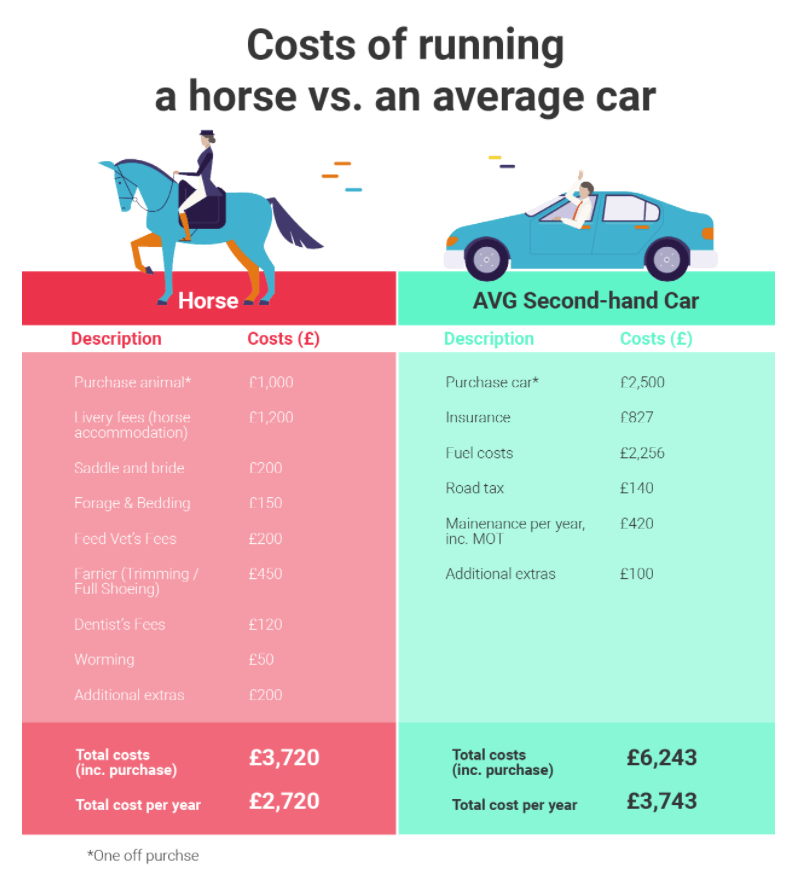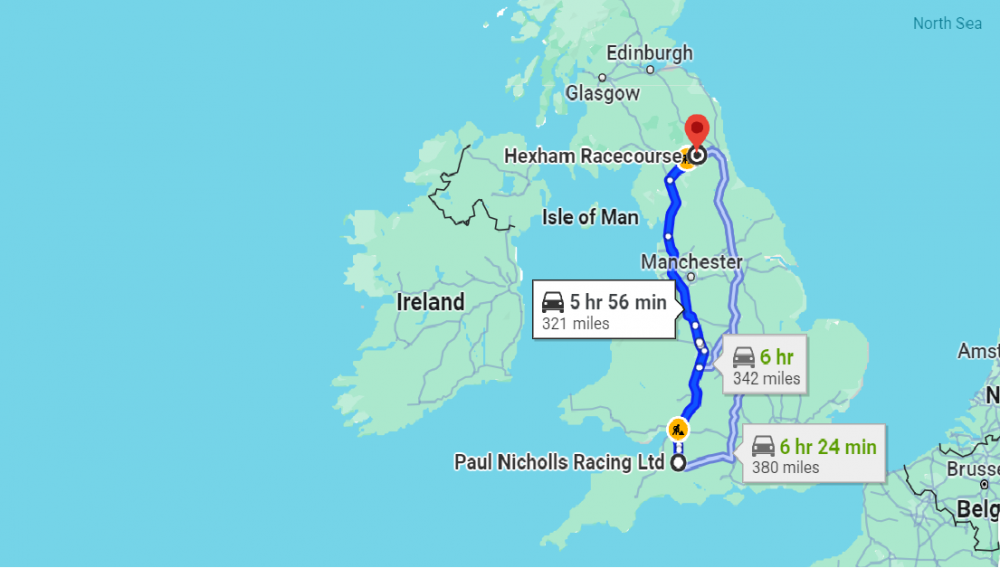
The financial figures that reveal you would be better off ditching your car for a HORSE

The financial figures that reveal you would be better off ditching your car for a HORSE
Following the continued crackdown on combustion engine vehicles and the impending increase in Vehicle Excise Duty (VED) rates that come into place as of April this year, our data boffins here at myracing.com decided to crunch the financial and environmental numbers to determine whether owning a horse is in now CHEAPER than owning and commuting to work by car.
And what we found will shock you!
It appears that turning back the clock to a time when horses ruled the roads would not only benefit the environment but your bank balance too.
According to figures backed by the Environmental Protection Agency and DEFRA, the average passenger vehicle produces 4.7 metric tonnes of carbon dioxide, along with 2.7 tonnes of methane per year.
Contrast this to the humble horse, and you’re looking at close to zero tonnes of carbon dioxide emissions (due to the closed loop carbon cycle) and 2.07 tonnes of methane – a decrease on the average car of 23%.
Being so environmentally friendly, running a horse would make you ineligible for both road tax and city congestion charges. Should fellow city commuters follow suit and the UK would easily meet the EU's C02 emissions targets.
Below we break down how much you could save by commuting to work on a horse instead of by car…

Not accounting for parking or congestion charges, running a horse is a staggering £1,023 CHEAPER per year than a car and that’s before we even get onto the ways you can make your pony pay for itself.
A typical 500kg horse will produce 12 metric tonnes of manure per year. If you feed the horse the right diet and manage to sell the manure to farmers and allotment gardeners for a very reasonable 25p per kilo (way below the industry price), you’d be in for a £3,000 per year windfall, easily covering the running costs of the horse for each year and more!
Furthermore, riding to work over driving presents a whole host of health benefits. Countless studies have highlighted the risks to our mental and physical health when driving to and from work.
Increases in blood pressure, cholesterol levels and anxiety are common and place one right at risk of heart disease, kidney disease and even dementia. Furthermore, being sedentary for long periods of time also increases blood sugar levels, leaving one vulnerable to prediabetes and type 2 diabetes.
However, riding is associated with a number of health benefits. It’s a whole body workout that strengthens our muscles and joints and counts towards the NHS’ physical activity guidelines. Being an isometric exercise, It also stimulates nerve cells and has been found to improve posture and muscle strength and tone over time.
It speaks for itself that driving a car for one hour only burns 118 calories while riding a horse for the same amount of time burns over 360 calories – an increase of 205%.
If this wasn’t enough to convince you, being in close proximity to animals has been found to increase levels of the mood enhancing hormone, serotonin, which would explain why a recent study found that 80% of horse riders reported that riding made them feel ‘quite a lot’ or ‘extremely’ cheerful, relaxed and happy.
If we all commuted to work by Horse, who could say how much happier we’d all be!
With all said and done though, these health and financial benefits really only make sense if you live relatively close to your place of employment ( approximately 5 -15 miles). If you’re up and down the motorway every day, this might not be the best financial decision you make.
Sources:
https://econlife.com/2012/12/19th-century-urban-horse-pollution/
https://sustainability.stackexchange.com/questions/4587/impact-on-environment-a-million-horses-vs-a-million-cars
https://www.historic-uk.com/HistoryUK/HistoryofBritain/Great-Horse-Manure-Crisis-of-1894/
https://nautil.us/issue/7/waste/did-cars-save-our-cities-from-horses
https://www.quora.com/Do-horses-or-cars-emit-more-CO2-per-km
https://www.worsethanpoop.com/blog/2016/10/13/horse-v-co2-poop
https://missionrcd.org/wp-content/uploads/2014/04/A-Horse-Keepers-Guide1.pdf
https://theconversation.com/how-the-great-phosphorus-shortage-could-leave-us-all-hungry-54432
https://metro.co.uk/2014/02/05/innovative-and-privileged-commuters-avoid-tube-strike-misery-by-riding-their-horses-to-work-4291518/
https://www.thehorse.com/articles/32259/does-horses-waste-help-or-hinder-the-environment
https://science.time.com/2011/03/30/silence-the-cows-and-save-the-planet/
https://acrcd.org/Portals/0/Equine%20Fact%20Sheets/ManureMgtBooklet.pdf
https://www.newscientist.com/article/2159875-london-has-already-reached-air-pollution-limits-for-2018/
https://www.nrcs.usda.gov/Internet/FSE_DOCUMENTS/nrcs142p2_043440.pdf
https://articles.extension.org/pages/44740/what-is-the-carbon-footprint-of-a-horse-compared-to-an-automobile
https://www.sciencedirect.com/science/article/pii/S0960852412002404
https://www.citylab.com/life/2015/06/how-finland-is-turning-horse-poop-into-power/396230/
https://oppositelock.kinja.com/co2-emissions-are-stupid-the-horse-calculation-1736008830
https://www.quora.com/Do-horses-or-cars-emit-more-CO2-per-km
https://www.slate.com/articles/news_and_politics/explainer/2009/08/7_billion_carbon_sinks.html
https://www.horseandhound.co.uk/forums/showthread.php?82409-Selling-Horse-Manure
https://www.millbryhill.co.uk/blog/2016/02/how-much-does-it-cost-to-own-a-horse/
https://www.insurethebox.com/average-cost-running-owning-car/
https://www.dailymail.co.uk/news/article-2514297/3-500-year-makes-Britain-expensive-place-run-car.html
https://www.confused.com/car-insurance/price-index
https://home.bt.com/lifestyle/health/fitness/health-benefits-of-horse-riding-7-great-reasons-to-take-up-the-sport-11364077995230
https://www.successful-horse-training-and-care.com/this-is-how-many-calories-you-burn-while-horseback-riding.html







